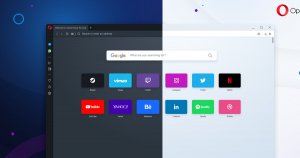 Opera Browser announces TRON wallet integration
Opera Browser announces TRON wallet integration Opera Browser announces TRON wallet integration

Cover art/illustration via CryptoSlate. Image includes combined content which may include AI-generated content.
For many cryptocurrency supporters, 2019 will be remembered for the sector’s resurgence and the improved usability of crypto assets.
For some, these changes manifested as prominent retailers, including Starbucks, Nordstrom, and Whole Foods, opened their checkout lanes to cryptocurrencies. Meanwhile, others saw the expanding crypto derivatives market as a new way to facilitate crypto investment.
Wherever you look, cryptocurrency usability is continually improving, something that was again evident this week when desktop and mobile browsing app, Opera, announced that it will directly integrate with TRON’s wallet.
This additional functionality makes cryptocurrency usability more accessible for the browser’s 350 million users.
Not only will TRON’s TRX token work directly with Opera’s browser, but it also provides users with access to TRON’s DApps from the browser’s native DApp store.
TRON becomes the third crypto asset to integrate with Opera’s browser, joining Bitcoin and Ethereum as a triumvirate of digital tokens now usable on a widely used internet browser. In an October 22nd statement, TRON CEO, Justin Sun, was effusive in praising the platform:
“Opera is one of the most important companies in the world. They are bringing security, privacy, and dynamic cryptocurrency capabilities to hundreds of millions of users. We are proud to connect the largest active blockchain ecosystem to the best web browser ever built.”
The integration of cryptocurrencies directly into a web browser’s interface is a critical step for usability, putting digital assets at users’ fingertips in a natural and easy-to-understand way.
Why integration matters
Indeed, Opera’s browser has been instrumental in bringing cryptocurrency usability to the internet by making their application seamless and intuitive rather than complicated and opaque.
For instance, when crypto wallets are directly integrated with a browser, users can quickly make payments on platforms that allow this functionality, and they can easily store their digital assets and collectibles in their browser wallet.

Without this accessibility, users are left trying to develop workarounds that always fall short of the ideal user experience.
Opera was the first browser to provide this experience, starting with Bitcoin and adding Ethereum functionality in 2018. At the time, the addition of Ethereum’s ERC-20 tokens represented a significant effort to bring Web3 capabilities to a broad audience of users and developers.
Today, TRON serves a similar role in the crypto ecosystem, providing high-throughput decentralized infrastructure for DApp development.
Shared values
The Opera browser and many in the cryptocurrency space share a similar ethos that is, in many ways, anathema in the digital age.
For example, Opera is an unparalleled advocate of privacy and security, values that are manifested by its free incorporation of VPN, ad blockers, integrated messenger, and private mode.
Moreover, Opera is a Web3 visionary, a catchall term that refers to the intersection of cryptocurrencies, blockchain technology, and distributed systems.
By integrating cryptocurrencies and their ecosystems directly into their browser, Opera is striving to facilitate the internet of the future, one of which is undoubtedly more secure, private, and functional than today’s internet infrastructure. In doing so, it’s relying on platforms like Bitcoin, Ethereum, and TRON to realize this vision.






























































